Organisational Learning: Importance, Theories, Models, and Practices
VerifiedAdded on 2023/01/12
|12
|3411
|61
Report
AI Summary
This report delves into the concept of organisational learning, defining it as a process that enhances knowledge and understanding within a working culture, contrasting it with a learning organisation that strategically maximizes continuous learning. The report explores the characteristics, benefits, and barriers of both, highlighting the importance of organisational learning in employee development and knowledge transfer. It examines various learning development theories, including behaviorism, constructivism, and cognitive learning, alongside different learning models. The report emphasizes the significance of adapting to change and continuous training, and the role of management in fostering a learning environment to achieve organisational goals effectively.

Written Report 1
Paraphrase This Document
Need a fresh take? Get an instant paraphrase of this document with our AI Paraphraser
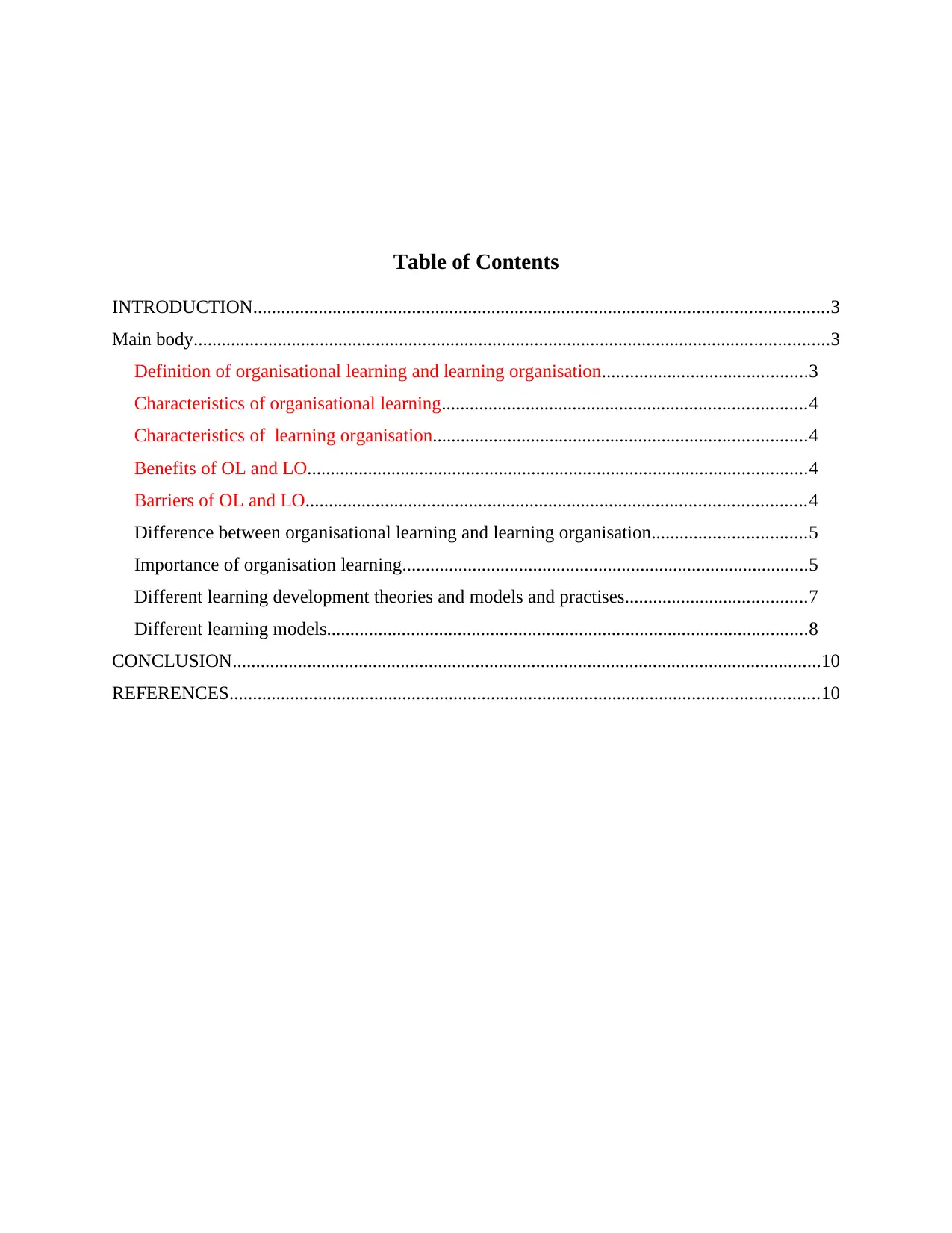
Table of Contents
INTRODUCTION...........................................................................................................................3
Main body........................................................................................................................................3
Definition of organisational learning and learning organisation............................................3
Characteristics of organisational learning..............................................................................4
Characteristics of learning organisation................................................................................4
Benefits of OL and LO...........................................................................................................4
Barriers of OL and LO...........................................................................................................4
Difference between organisational learning and learning organisation.................................5
Importance of organisation learning.......................................................................................5
Different learning development theories and models and practises.......................................7
Different learning models.......................................................................................................8
CONCLUSION..............................................................................................................................10
REFERENCES..............................................................................................................................10
INTRODUCTION...........................................................................................................................3
Main body........................................................................................................................................3
Definition of organisational learning and learning organisation............................................3
Characteristics of organisational learning..............................................................................4
Characteristics of learning organisation................................................................................4
Benefits of OL and LO...........................................................................................................4
Barriers of OL and LO...........................................................................................................4
Difference between organisational learning and learning organisation.................................5
Importance of organisation learning.......................................................................................5
Different learning development theories and models and practises.......................................7
Different learning models.......................................................................................................8
CONCLUSION..............................................................................................................................10
REFERENCES..............................................................................................................................10
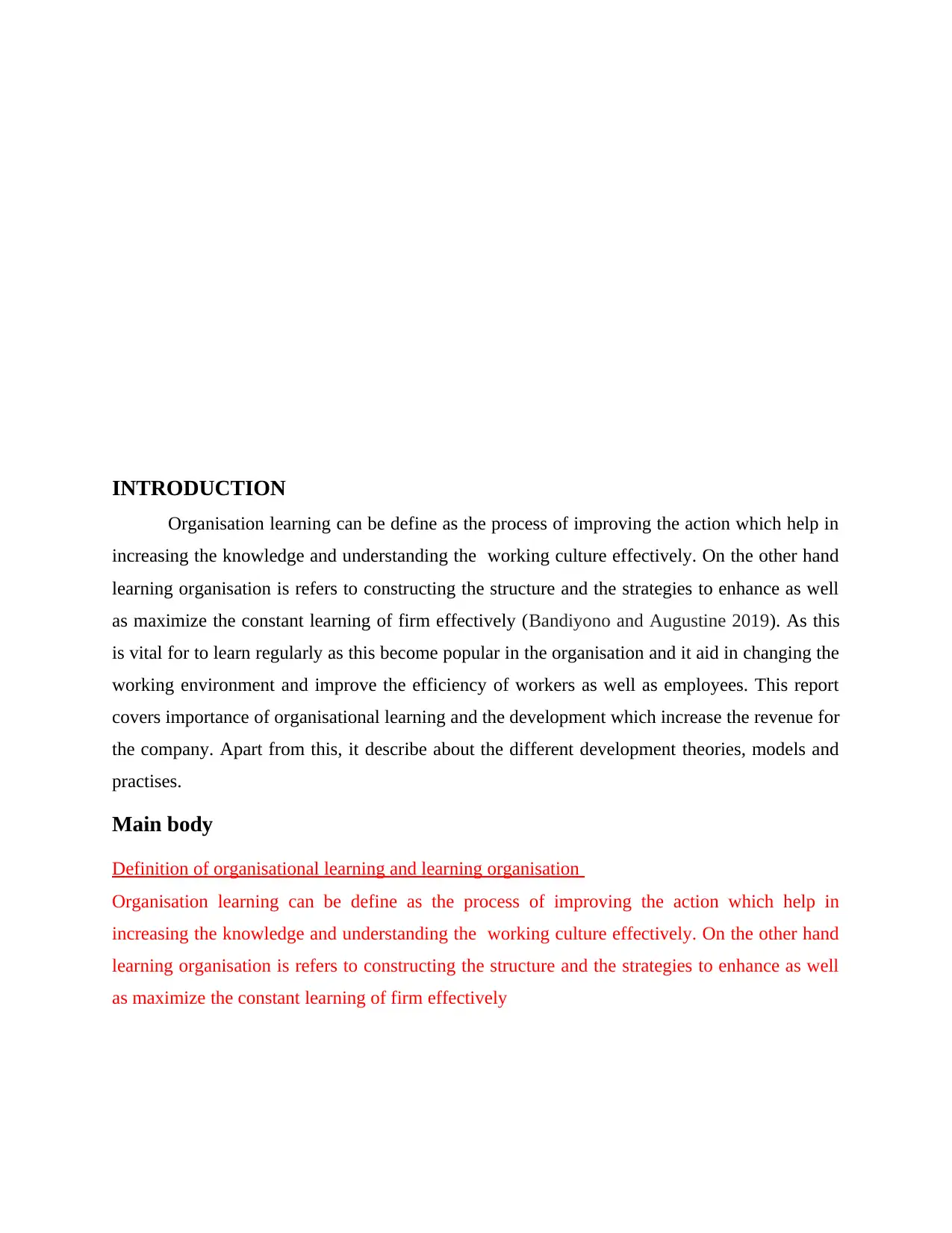
INTRODUCTION
Organisation learning can be define as the process of improving the action which help in
increasing the knowledge and understanding the working culture effectively. On the other hand
learning organisation is refers to constructing the structure and the strategies to enhance as well
as maximize the constant learning of firm effectively (Bandiyono and Augustine 2019). As this
is vital for to learn regularly as this become popular in the organisation and it aid in changing the
working environment and improve the efficiency of workers as well as employees. This report
covers importance of organisational learning and the development which increase the revenue for
the company. Apart from this, it describe about the different development theories, models and
practises.
Main body
Definition of organisational learning and learning organisation
Organisation learning can be define as the process of improving the action which help in
increasing the knowledge and understanding the working culture effectively. On the other hand
learning organisation is refers to constructing the structure and the strategies to enhance as well
as maximize the constant learning of firm effectively
Organisation learning can be define as the process of improving the action which help in
increasing the knowledge and understanding the working culture effectively. On the other hand
learning organisation is refers to constructing the structure and the strategies to enhance as well
as maximize the constant learning of firm effectively (Bandiyono and Augustine 2019). As this
is vital for to learn regularly as this become popular in the organisation and it aid in changing the
working environment and improve the efficiency of workers as well as employees. This report
covers importance of organisational learning and the development which increase the revenue for
the company. Apart from this, it describe about the different development theories, models and
practises.
Main body
Definition of organisational learning and learning organisation
Organisation learning can be define as the process of improving the action which help in
increasing the knowledge and understanding the working culture effectively. On the other hand
learning organisation is refers to constructing the structure and the strategies to enhance as well
as maximize the constant learning of firm effectively
⊘ This is a preview!⊘
Do you want full access?
Subscribe today to unlock all pages.

Trusted by 1+ million students worldwide
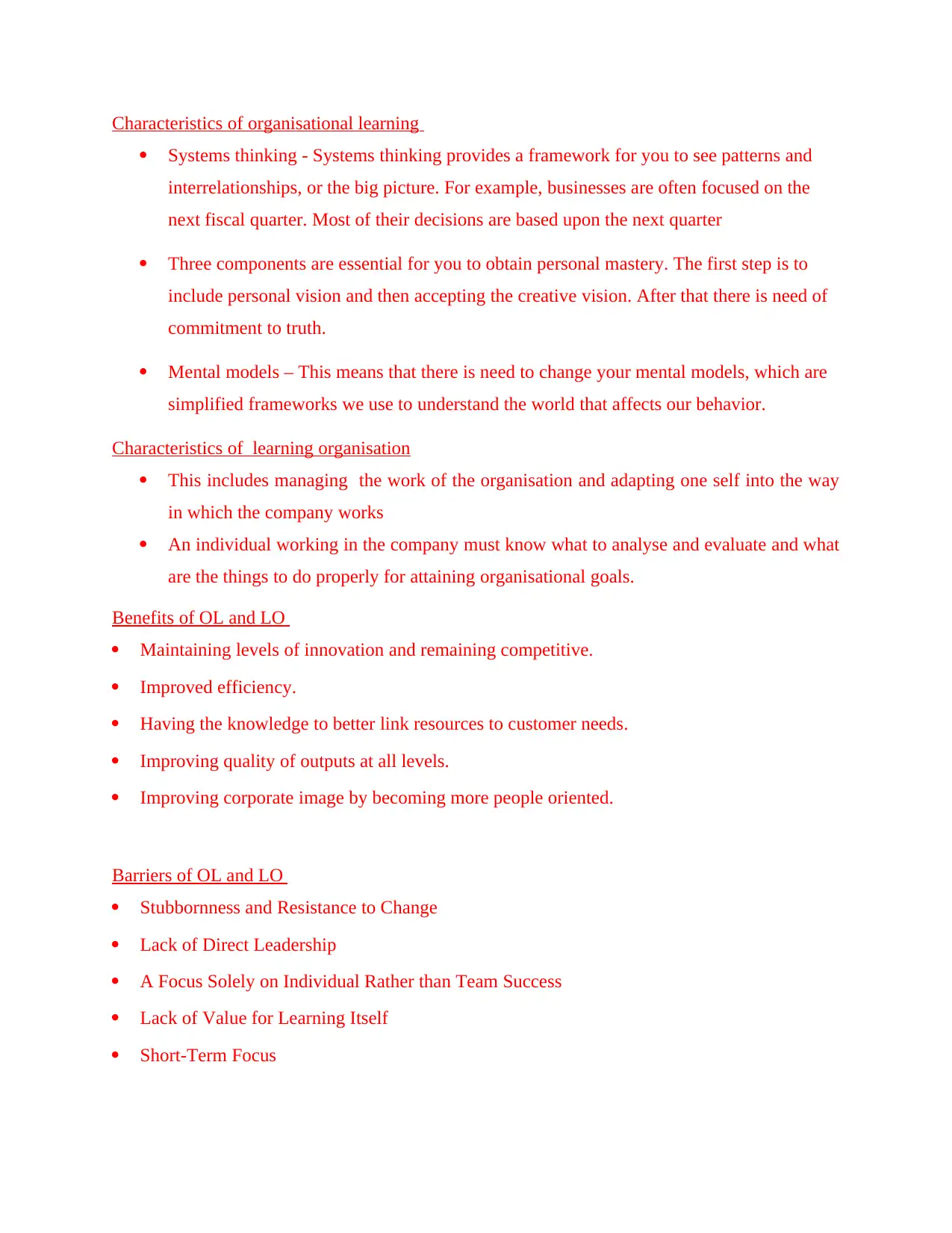
Characteristics of organisational learning
Systems thinking - Systems thinking provides a framework for you to see patterns and
interrelationships, or the big picture. For example, businesses are often focused on the
next fiscal quarter. Most of their decisions are based upon the next quarter
Three components are essential for you to obtain personal mastery. The first step is to
include personal vision and then accepting the creative vision. After that there is need of
commitment to truth.
Mental models – This means that there is need to change your mental models, which are
simplified frameworks we use to understand the world that affects our behavior.
Characteristics of learning organisation
This includes managing the work of the organisation and adapting one self into the way
in which the company works
An individual working in the company must know what to analyse and evaluate and what
are the things to do properly for attaining organisational goals.
Benefits of OL and LO
Maintaining levels of innovation and remaining competitive.
Improved efficiency.
Having the knowledge to better link resources to customer needs.
Improving quality of outputs at all levels.
Improving corporate image by becoming more people oriented.
Barriers of OL and LO
Stubbornness and Resistance to Change
Lack of Direct Leadership
A Focus Solely on Individual Rather than Team Success
Lack of Value for Learning Itself
Short-Term Focus
Systems thinking - Systems thinking provides a framework for you to see patterns and
interrelationships, or the big picture. For example, businesses are often focused on the
next fiscal quarter. Most of their decisions are based upon the next quarter
Three components are essential for you to obtain personal mastery. The first step is to
include personal vision and then accepting the creative vision. After that there is need of
commitment to truth.
Mental models – This means that there is need to change your mental models, which are
simplified frameworks we use to understand the world that affects our behavior.
Characteristics of learning organisation
This includes managing the work of the organisation and adapting one self into the way
in which the company works
An individual working in the company must know what to analyse and evaluate and what
are the things to do properly for attaining organisational goals.
Benefits of OL and LO
Maintaining levels of innovation and remaining competitive.
Improved efficiency.
Having the knowledge to better link resources to customer needs.
Improving quality of outputs at all levels.
Improving corporate image by becoming more people oriented.
Barriers of OL and LO
Stubbornness and Resistance to Change
Lack of Direct Leadership
A Focus Solely on Individual Rather than Team Success
Lack of Value for Learning Itself
Short-Term Focus
Paraphrase This Document
Need a fresh take? Get an instant paraphrase of this document with our AI Paraphraser
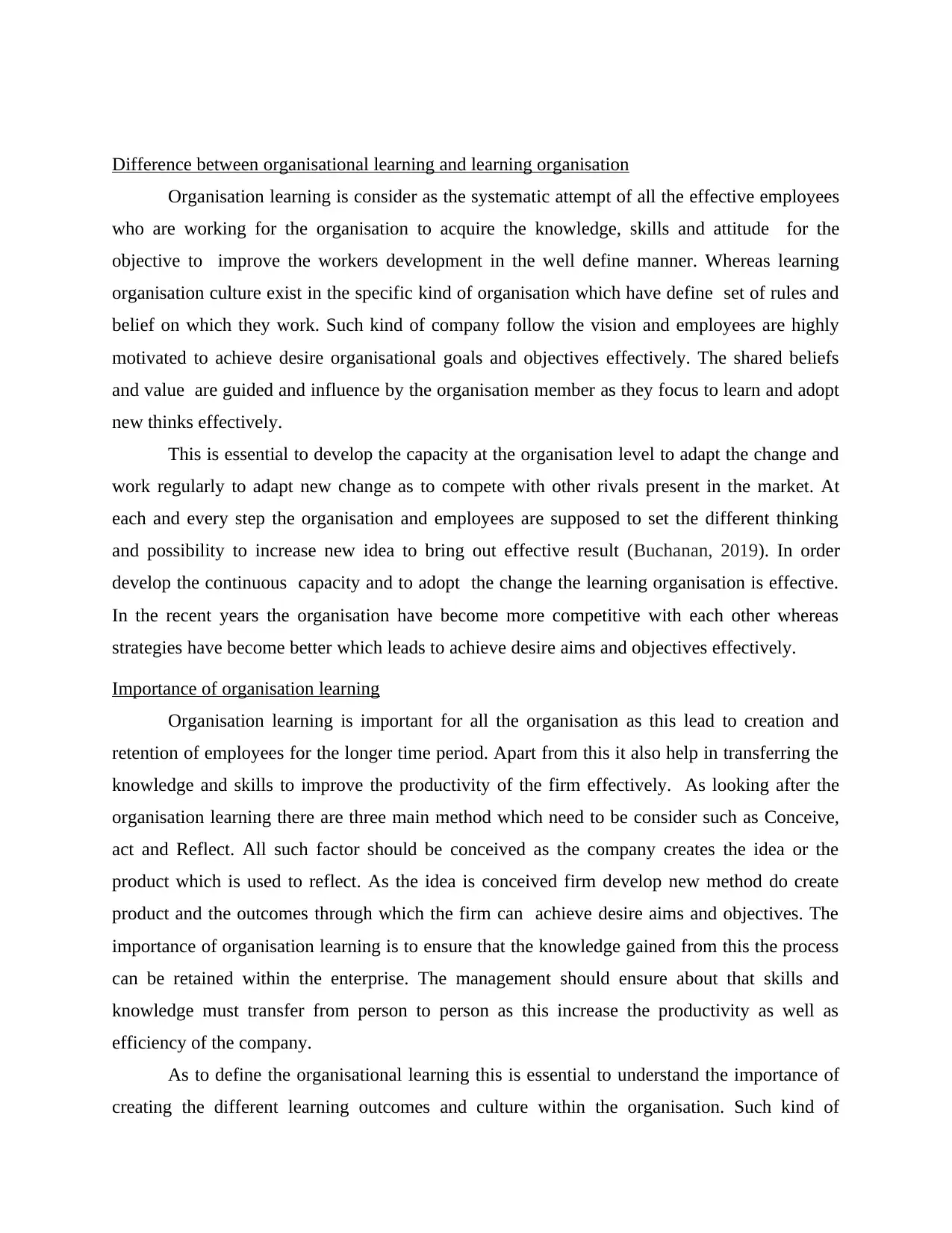
Difference between organisational learning and learning organisation
Organisation learning is consider as the systematic attempt of all the effective employees
who are working for the organisation to acquire the knowledge, skills and attitude for the
objective to improve the workers development in the well define manner. Whereas learning
organisation culture exist in the specific kind of organisation which have define set of rules and
belief on which they work. Such kind of company follow the vision and employees are highly
motivated to achieve desire organisational goals and objectives effectively. The shared beliefs
and value are guided and influence by the organisation member as they focus to learn and adopt
new thinks effectively.
This is essential to develop the capacity at the organisation level to adapt the change and
work regularly to adapt new change as to compete with other rivals present in the market. At
each and every step the organisation and employees are supposed to set the different thinking
and possibility to increase new idea to bring out effective result (Buchanan, 2019). In order
develop the continuous capacity and to adopt the change the learning organisation is effective.
In the recent years the organisation have become more competitive with each other whereas
strategies have become better which leads to achieve desire aims and objectives effectively.
Importance of organisation learning
Organisation learning is important for all the organisation as this lead to creation and
retention of employees for the longer time period. Apart from this it also help in transferring the
knowledge and skills to improve the productivity of the firm effectively. As looking after the
organisation learning there are three main method which need to be consider such as Conceive,
act and Reflect. All such factor should be conceived as the company creates the idea or the
product which is used to reflect. As the idea is conceived firm develop new method do create
product and the outcomes through which the firm can achieve desire aims and objectives. The
importance of organisation learning is to ensure that the knowledge gained from this the process
can be retained within the enterprise. The management should ensure about that skills and
knowledge must transfer from person to person as this increase the productivity as well as
efficiency of the company.
As to define the organisational learning this is essential to understand the importance of
creating the different learning outcomes and culture within the organisation. Such kind of
Organisation learning is consider as the systematic attempt of all the effective employees
who are working for the organisation to acquire the knowledge, skills and attitude for the
objective to improve the workers development in the well define manner. Whereas learning
organisation culture exist in the specific kind of organisation which have define set of rules and
belief on which they work. Such kind of company follow the vision and employees are highly
motivated to achieve desire organisational goals and objectives effectively. The shared beliefs
and value are guided and influence by the organisation member as they focus to learn and adopt
new thinks effectively.
This is essential to develop the capacity at the organisation level to adapt the change and
work regularly to adapt new change as to compete with other rivals present in the market. At
each and every step the organisation and employees are supposed to set the different thinking
and possibility to increase new idea to bring out effective result (Buchanan, 2019). In order
develop the continuous capacity and to adopt the change the learning organisation is effective.
In the recent years the organisation have become more competitive with each other whereas
strategies have become better which leads to achieve desire aims and objectives effectively.
Importance of organisation learning
Organisation learning is important for all the organisation as this lead to creation and
retention of employees for the longer time period. Apart from this it also help in transferring the
knowledge and skills to improve the productivity of the firm effectively. As looking after the
organisation learning there are three main method which need to be consider such as Conceive,
act and Reflect. All such factor should be conceived as the company creates the idea or the
product which is used to reflect. As the idea is conceived firm develop new method do create
product and the outcomes through which the firm can achieve desire aims and objectives. The
importance of organisation learning is to ensure that the knowledge gained from this the process
can be retained within the enterprise. The management should ensure about that skills and
knowledge must transfer from person to person as this increase the productivity as well as
efficiency of the company.
As to define the organisational learning this is essential to understand the importance of
creating the different learning outcomes and culture within the organisation. Such kind of
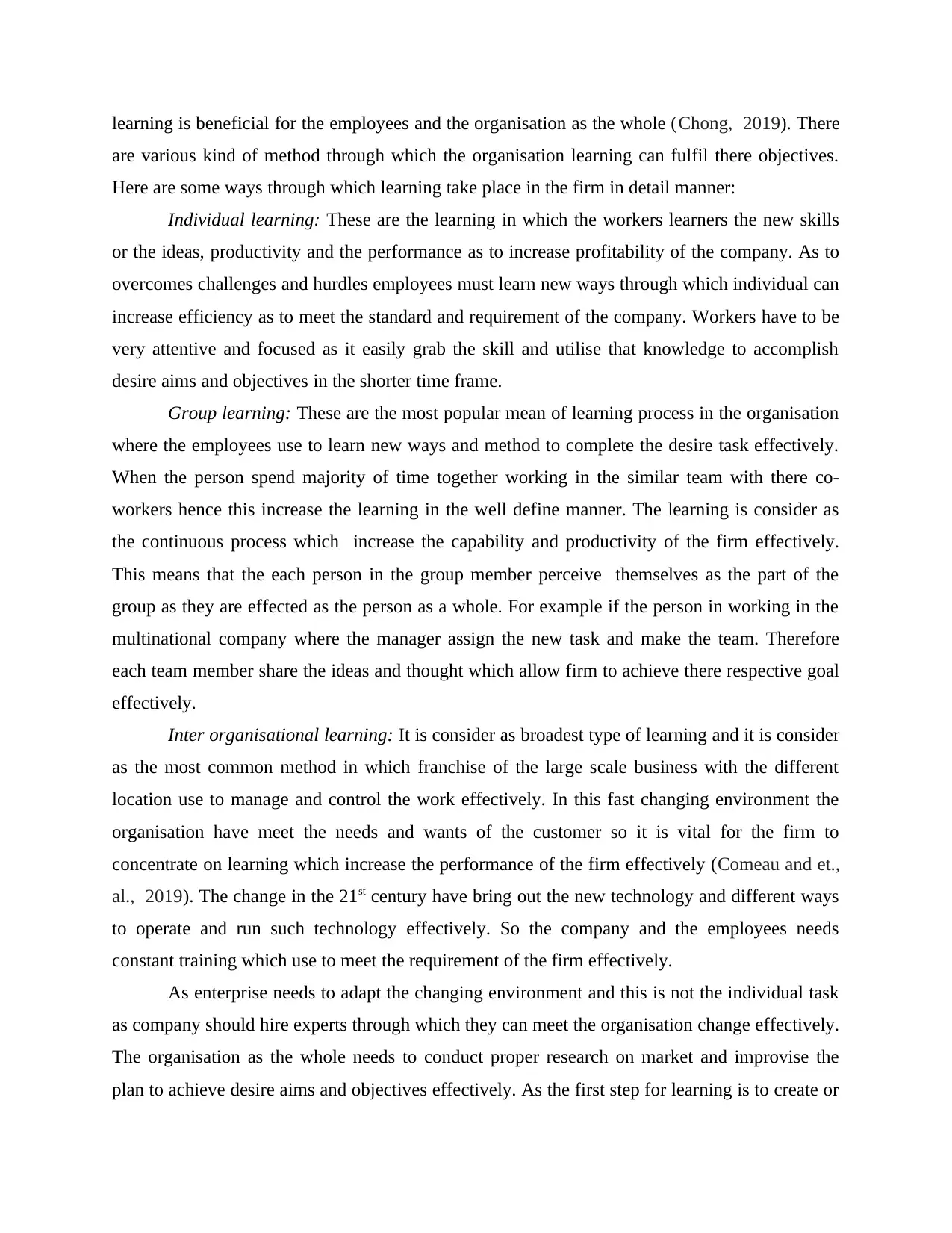
learning is beneficial for the employees and the organisation as the whole (Chong, 2019). There
are various kind of method through which the organisation learning can fulfil there objectives.
Here are some ways through which learning take place in the firm in detail manner:
Individual learning: These are the learning in which the workers learners the new skills
or the ideas, productivity and the performance as to increase profitability of the company. As to
overcomes challenges and hurdles employees must learn new ways through which individual can
increase efficiency as to meet the standard and requirement of the company. Workers have to be
very attentive and focused as it easily grab the skill and utilise that knowledge to accomplish
desire aims and objectives in the shorter time frame.
Group learning: These are the most popular mean of learning process in the organisation
where the employees use to learn new ways and method to complete the desire task effectively.
When the person spend majority of time together working in the similar team with there co-
workers hence this increase the learning in the well define manner. The learning is consider as
the continuous process which increase the capability and productivity of the firm effectively.
This means that the each person in the group member perceive themselves as the part of the
group as they are effected as the person as a whole. For example if the person in working in the
multinational company where the manager assign the new task and make the team. Therefore
each team member share the ideas and thought which allow firm to achieve there respective goal
effectively.
Inter organisational learning: It is consider as broadest type of learning and it is consider
as the most common method in which franchise of the large scale business with the different
location use to manage and control the work effectively. In this fast changing environment the
organisation have meet the needs and wants of the customer so it is vital for the firm to
concentrate on learning which increase the performance of the firm effectively (Comeau and et.,
al., 2019). The change in the 21st century have bring out the new technology and different ways
to operate and run such technology effectively. So the company and the employees needs
constant training which use to meet the requirement of the firm effectively.
As enterprise needs to adapt the changing environment and this is not the individual task
as company should hire experts through which they can meet the organisation change effectively.
The organisation as the whole needs to conduct proper research on market and improvise the
plan to achieve desire aims and objectives effectively. As the first step for learning is to create or
are various kind of method through which the organisation learning can fulfil there objectives.
Here are some ways through which learning take place in the firm in detail manner:
Individual learning: These are the learning in which the workers learners the new skills
or the ideas, productivity and the performance as to increase profitability of the company. As to
overcomes challenges and hurdles employees must learn new ways through which individual can
increase efficiency as to meet the standard and requirement of the company. Workers have to be
very attentive and focused as it easily grab the skill and utilise that knowledge to accomplish
desire aims and objectives in the shorter time frame.
Group learning: These are the most popular mean of learning process in the organisation
where the employees use to learn new ways and method to complete the desire task effectively.
When the person spend majority of time together working in the similar team with there co-
workers hence this increase the learning in the well define manner. The learning is consider as
the continuous process which increase the capability and productivity of the firm effectively.
This means that the each person in the group member perceive themselves as the part of the
group as they are effected as the person as a whole. For example if the person in working in the
multinational company where the manager assign the new task and make the team. Therefore
each team member share the ideas and thought which allow firm to achieve there respective goal
effectively.
Inter organisational learning: It is consider as broadest type of learning and it is consider
as the most common method in which franchise of the large scale business with the different
location use to manage and control the work effectively. In this fast changing environment the
organisation have meet the needs and wants of the customer so it is vital for the firm to
concentrate on learning which increase the performance of the firm effectively (Comeau and et.,
al., 2019). The change in the 21st century have bring out the new technology and different ways
to operate and run such technology effectively. So the company and the employees needs
constant training which use to meet the requirement of the firm effectively.
As enterprise needs to adapt the changing environment and this is not the individual task
as company should hire experts through which they can meet the organisation change effectively.
The organisation as the whole needs to conduct proper research on market and improvise the
plan to achieve desire aims and objectives effectively. As the first step for learning is to create or
⊘ This is a preview!⊘
Do you want full access?
Subscribe today to unlock all pages.

Trusted by 1+ million students worldwide
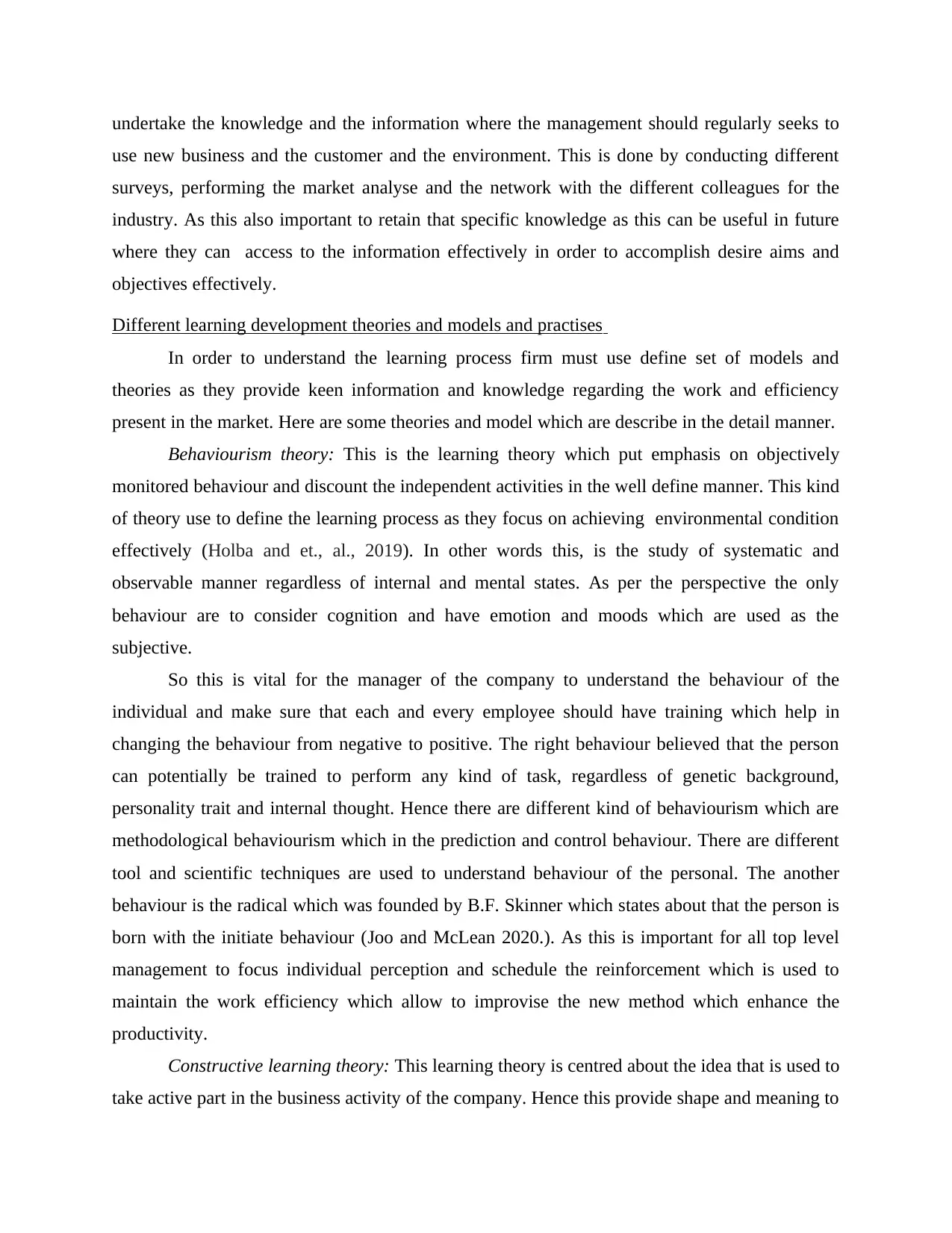
undertake the knowledge and the information where the management should regularly seeks to
use new business and the customer and the environment. This is done by conducting different
surveys, performing the market analyse and the network with the different colleagues for the
industry. As this also important to retain that specific knowledge as this can be useful in future
where they can access to the information effectively in order to accomplish desire aims and
objectives effectively.
Different learning development theories and models and practises
In order to understand the learning process firm must use define set of models and
theories as they provide keen information and knowledge regarding the work and efficiency
present in the market. Here are some theories and model which are describe in the detail manner.
Behaviourism theory: This is the learning theory which put emphasis on objectively
monitored behaviour and discount the independent activities in the well define manner. This kind
of theory use to define the learning process as they focus on achieving environmental condition
effectively (Holba and et., al., 2019). In other words this, is the study of systematic and
observable manner regardless of internal and mental states. As per the perspective the only
behaviour are to consider cognition and have emotion and moods which are used as the
subjective.
So this is vital for the manager of the company to understand the behaviour of the
individual and make sure that each and every employee should have training which help in
changing the behaviour from negative to positive. The right behaviour believed that the person
can potentially be trained to perform any kind of task, regardless of genetic background,
personality trait and internal thought. Hence there are different kind of behaviourism which are
methodological behaviourism which in the prediction and control behaviour. There are different
tool and scientific techniques are used to understand behaviour of the personal. The another
behaviour is the radical which was founded by B.F. Skinner which states about that the person is
born with the initiate behaviour (Joo and McLean 2020.). As this is important for all top level
management to focus individual perception and schedule the reinforcement which is used to
maintain the work efficiency which allow to improvise the new method which enhance the
productivity.
Constructive learning theory: This learning theory is centred about the idea that is used to
take active part in the business activity of the company. Hence this provide shape and meaning to
use new business and the customer and the environment. This is done by conducting different
surveys, performing the market analyse and the network with the different colleagues for the
industry. As this also important to retain that specific knowledge as this can be useful in future
where they can access to the information effectively in order to accomplish desire aims and
objectives effectively.
Different learning development theories and models and practises
In order to understand the learning process firm must use define set of models and
theories as they provide keen information and knowledge regarding the work and efficiency
present in the market. Here are some theories and model which are describe in the detail manner.
Behaviourism theory: This is the learning theory which put emphasis on objectively
monitored behaviour and discount the independent activities in the well define manner. This kind
of theory use to define the learning process as they focus on achieving environmental condition
effectively (Holba and et., al., 2019). In other words this, is the study of systematic and
observable manner regardless of internal and mental states. As per the perspective the only
behaviour are to consider cognition and have emotion and moods which are used as the
subjective.
So this is vital for the manager of the company to understand the behaviour of the
individual and make sure that each and every employee should have training which help in
changing the behaviour from negative to positive. The right behaviour believed that the person
can potentially be trained to perform any kind of task, regardless of genetic background,
personality trait and internal thought. Hence there are different kind of behaviourism which are
methodological behaviourism which in the prediction and control behaviour. There are different
tool and scientific techniques are used to understand behaviour of the personal. The another
behaviour is the radical which was founded by B.F. Skinner which states about that the person is
born with the initiate behaviour (Joo and McLean 2020.). As this is important for all top level
management to focus individual perception and schedule the reinforcement which is used to
maintain the work efficiency which allow to improvise the new method which enhance the
productivity.
Constructive learning theory: This learning theory is centred about the idea that is used to
take active part in the business activity of the company. Hence this provide shape and meaning to
Paraphrase This Document
Need a fresh take? Get an instant paraphrase of this document with our AI Paraphraser
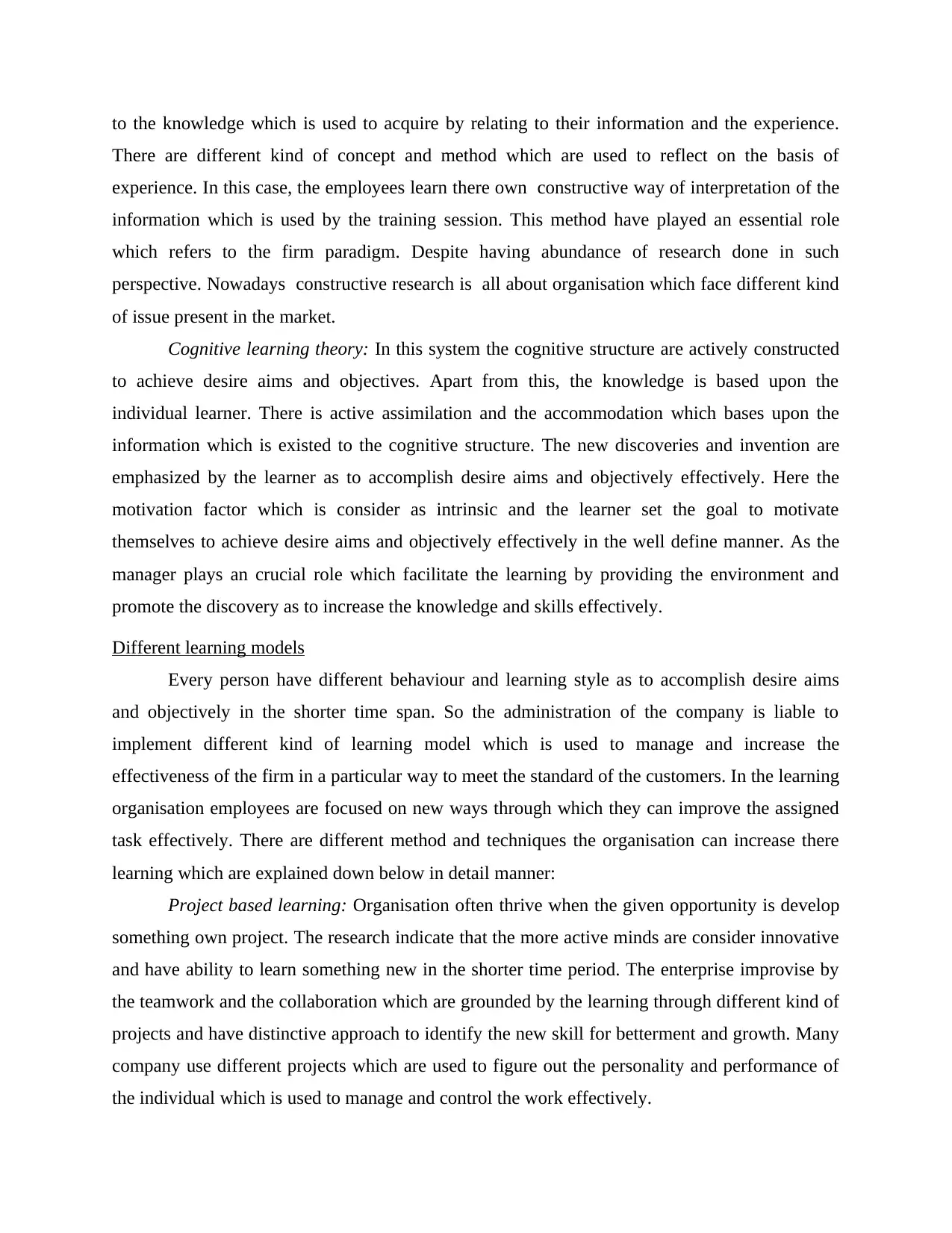
to the knowledge which is used to acquire by relating to their information and the experience.
There are different kind of concept and method which are used to reflect on the basis of
experience. In this case, the employees learn there own constructive way of interpretation of the
information which is used by the training session. This method have played an essential role
which refers to the firm paradigm. Despite having abundance of research done in such
perspective. Nowadays constructive research is all about organisation which face different kind
of issue present in the market.
Cognitive learning theory: In this system the cognitive structure are actively constructed
to achieve desire aims and objectives. Apart from this, the knowledge is based upon the
individual learner. There is active assimilation and the accommodation which bases upon the
information which is existed to the cognitive structure. The new discoveries and invention are
emphasized by the learner as to accomplish desire aims and objectively effectively. Here the
motivation factor which is consider as intrinsic and the learner set the goal to motivate
themselves to achieve desire aims and objectively effectively in the well define manner. As the
manager plays an crucial role which facilitate the learning by providing the environment and
promote the discovery as to increase the knowledge and skills effectively.
Different learning models
Every person have different behaviour and learning style as to accomplish desire aims
and objectively in the shorter time span. So the administration of the company is liable to
implement different kind of learning model which is used to manage and increase the
effectiveness of the firm in a particular way to meet the standard of the customers. In the learning
organisation employees are focused on new ways through which they can improve the assigned
task effectively. There are different method and techniques the organisation can increase there
learning which are explained down below in detail manner:
Project based learning: Organisation often thrive when the given opportunity is develop
something own project. The research indicate that the more active minds are consider innovative
and have ability to learn something new in the shorter time period. The enterprise improvise by
the teamwork and the collaboration which are grounded by the learning through different kind of
projects and have distinctive approach to identify the new skill for betterment and growth. Many
company use different projects which are used to figure out the personality and performance of
the individual which is used to manage and control the work effectively.
There are different kind of concept and method which are used to reflect on the basis of
experience. In this case, the employees learn there own constructive way of interpretation of the
information which is used by the training session. This method have played an essential role
which refers to the firm paradigm. Despite having abundance of research done in such
perspective. Nowadays constructive research is all about organisation which face different kind
of issue present in the market.
Cognitive learning theory: In this system the cognitive structure are actively constructed
to achieve desire aims and objectives. Apart from this, the knowledge is based upon the
individual learner. There is active assimilation and the accommodation which bases upon the
information which is existed to the cognitive structure. The new discoveries and invention are
emphasized by the learner as to accomplish desire aims and objectively effectively. Here the
motivation factor which is consider as intrinsic and the learner set the goal to motivate
themselves to achieve desire aims and objectively effectively in the well define manner. As the
manager plays an crucial role which facilitate the learning by providing the environment and
promote the discovery as to increase the knowledge and skills effectively.
Different learning models
Every person have different behaviour and learning style as to accomplish desire aims
and objectively in the shorter time span. So the administration of the company is liable to
implement different kind of learning model which is used to manage and increase the
effectiveness of the firm in a particular way to meet the standard of the customers. In the learning
organisation employees are focused on new ways through which they can improve the assigned
task effectively. There are different method and techniques the organisation can increase there
learning which are explained down below in detail manner:
Project based learning: Organisation often thrive when the given opportunity is develop
something own project. The research indicate that the more active minds are consider innovative
and have ability to learn something new in the shorter time period. The enterprise improvise by
the teamwork and the collaboration which are grounded by the learning through different kind of
projects and have distinctive approach to identify the new skill for betterment and growth. Many
company use different projects which are used to figure out the personality and performance of
the individual which is used to manage and control the work effectively.
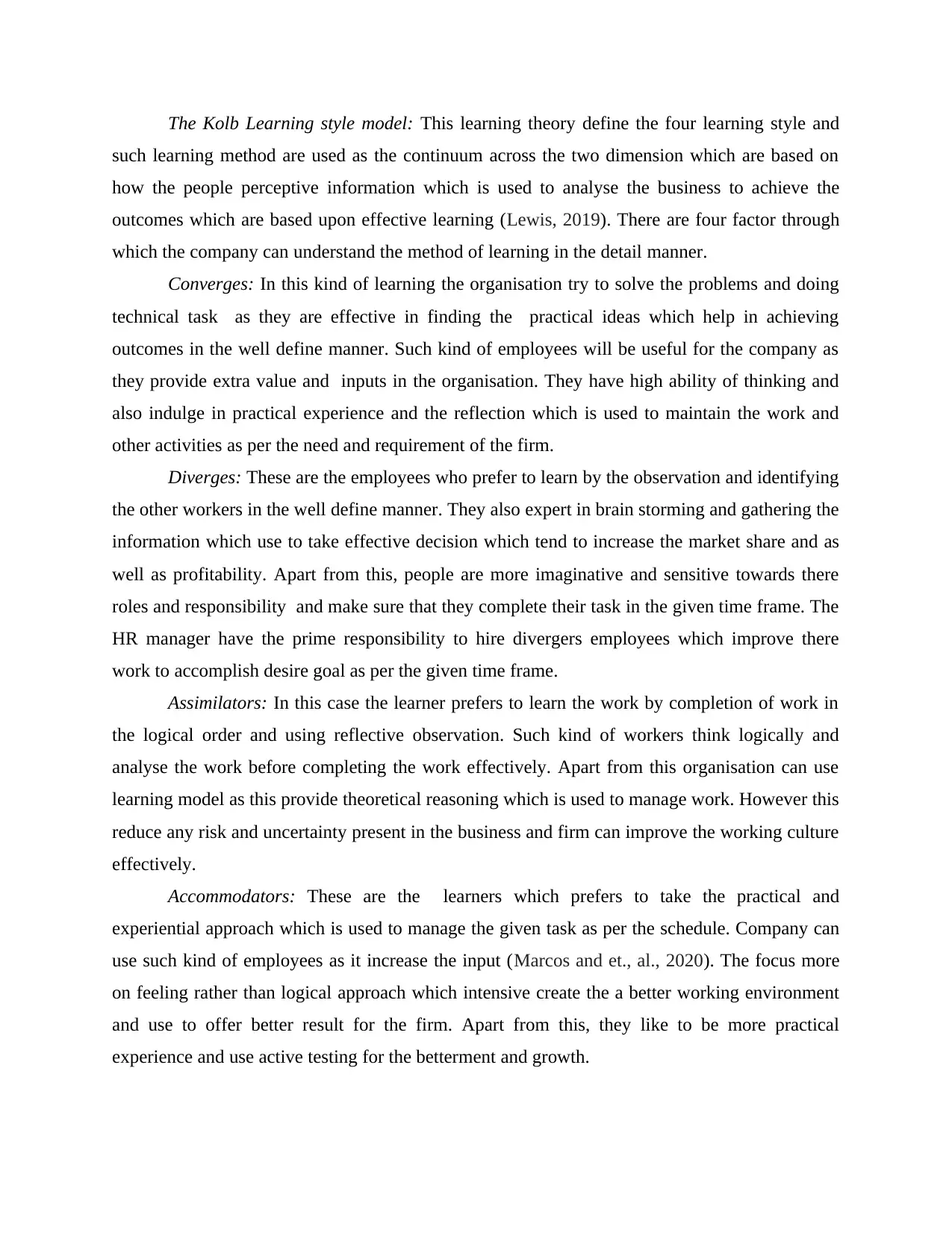
The Kolb Learning style model: This learning theory define the four learning style and
such learning method are used as the continuum across the two dimension which are based on
how the people perceptive information which is used to analyse the business to achieve the
outcomes which are based upon effective learning (Lewis, 2019). There are four factor through
which the company can understand the method of learning in the detail manner.
Converges: In this kind of learning the organisation try to solve the problems and doing
technical task as they are effective in finding the practical ideas which help in achieving
outcomes in the well define manner. Such kind of employees will be useful for the company as
they provide extra value and inputs in the organisation. They have high ability of thinking and
also indulge in practical experience and the reflection which is used to maintain the work and
other activities as per the need and requirement of the firm.
Diverges: These are the employees who prefer to learn by the observation and identifying
the other workers in the well define manner. They also expert in brain storming and gathering the
information which use to take effective decision which tend to increase the market share and as
well as profitability. Apart from this, people are more imaginative and sensitive towards there
roles and responsibility and make sure that they complete their task in the given time frame. The
HR manager have the prime responsibility to hire divergers employees which improve there
work to accomplish desire goal as per the given time frame.
Assimilators: In this case the learner prefers to learn the work by completion of work in
the logical order and using reflective observation. Such kind of workers think logically and
analyse the work before completing the work effectively. Apart from this organisation can use
learning model as this provide theoretical reasoning which is used to manage work. However this
reduce any risk and uncertainty present in the business and firm can improve the working culture
effectively.
Accommodators: These are the learners which prefers to take the practical and
experiential approach which is used to manage the given task as per the schedule. Company can
use such kind of employees as it increase the input (Marcos and et., al., 2020). The focus more
on feeling rather than logical approach which intensive create the a better working environment
and use to offer better result for the firm. Apart from this, they like to be more practical
experience and use active testing for the betterment and growth.
such learning method are used as the continuum across the two dimension which are based on
how the people perceptive information which is used to analyse the business to achieve the
outcomes which are based upon effective learning (Lewis, 2019). There are four factor through
which the company can understand the method of learning in the detail manner.
Converges: In this kind of learning the organisation try to solve the problems and doing
technical task as they are effective in finding the practical ideas which help in achieving
outcomes in the well define manner. Such kind of employees will be useful for the company as
they provide extra value and inputs in the organisation. They have high ability of thinking and
also indulge in practical experience and the reflection which is used to maintain the work and
other activities as per the need and requirement of the firm.
Diverges: These are the employees who prefer to learn by the observation and identifying
the other workers in the well define manner. They also expert in brain storming and gathering the
information which use to take effective decision which tend to increase the market share and as
well as profitability. Apart from this, people are more imaginative and sensitive towards there
roles and responsibility and make sure that they complete their task in the given time frame. The
HR manager have the prime responsibility to hire divergers employees which improve there
work to accomplish desire goal as per the given time frame.
Assimilators: In this case the learner prefers to learn the work by completion of work in
the logical order and using reflective observation. Such kind of workers think logically and
analyse the work before completing the work effectively. Apart from this organisation can use
learning model as this provide theoretical reasoning which is used to manage work. However this
reduce any risk and uncertainty present in the business and firm can improve the working culture
effectively.
Accommodators: These are the learners which prefers to take the practical and
experiential approach which is used to manage the given task as per the schedule. Company can
use such kind of employees as it increase the input (Marcos and et., al., 2020). The focus more
on feeling rather than logical approach which intensive create the a better working environment
and use to offer better result for the firm. Apart from this, they like to be more practical
experience and use active testing for the betterment and growth.
⊘ This is a preview!⊘
Do you want full access?
Subscribe today to unlock all pages.

Trusted by 1+ million students worldwide
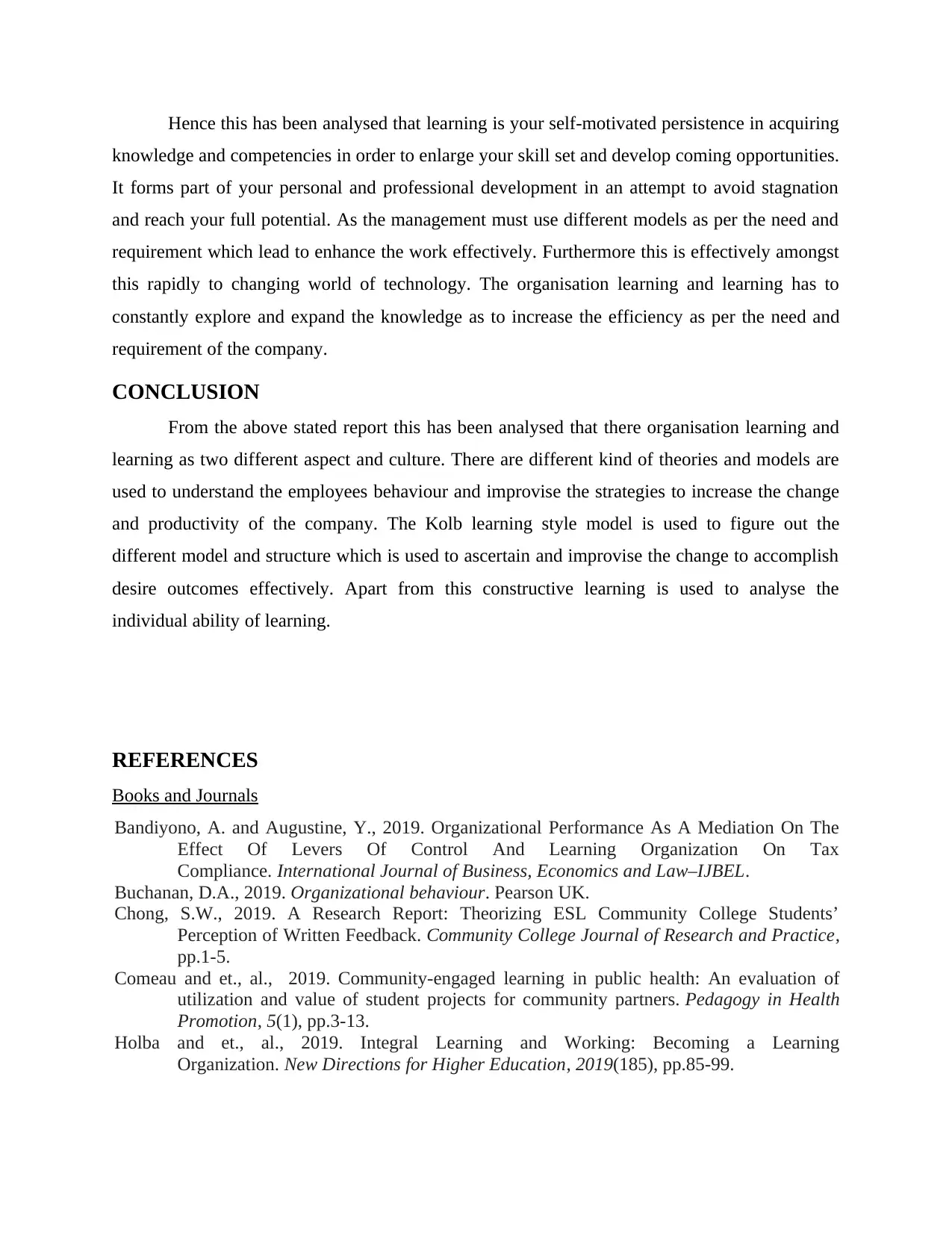
Hence this has been analysed that learning is your self-motivated persistence in acquiring
knowledge and competencies in order to enlarge your skill set and develop coming opportunities.
It forms part of your personal and professional development in an attempt to avoid stagnation
and reach your full potential. As the management must use different models as per the need and
requirement which lead to enhance the work effectively. Furthermore this is effectively amongst
this rapidly to changing world of technology. The organisation learning and learning has to
constantly explore and expand the knowledge as to increase the efficiency as per the need and
requirement of the company.
CONCLUSION
From the above stated report this has been analysed that there organisation learning and
learning as two different aspect and culture. There are different kind of theories and models are
used to understand the employees behaviour and improvise the strategies to increase the change
and productivity of the company. The Kolb learning style model is used to figure out the
different model and structure which is used to ascertain and improvise the change to accomplish
desire outcomes effectively. Apart from this constructive learning is used to analyse the
individual ability of learning.
REFERENCES
Books and Journals
Bandiyono, A. and Augustine, Y., 2019. Organizational Performance As A Mediation On The
Effect Of Levers Of Control And Learning Organization On Tax
Compliance. International Journal of Business, Economics and Law–IJBEL.
Buchanan, D.A., 2019. Organizational behaviour. Pearson UK.
Chong, S.W., 2019. A Research Report: Theorizing ESL Community College Students’
Perception of Written Feedback. Community College Journal of Research and Practice,
pp.1-5.
Comeau and et., al., 2019. Community-engaged learning in public health: An evaluation of
utilization and value of student projects for community partners. Pedagogy in Health
Promotion, 5(1), pp.3-13.
Holba and et., al., 2019. Integral Learning and Working: Becoming a Learning
Organization. New Directions for Higher Education, 2019(185), pp.85-99.
knowledge and competencies in order to enlarge your skill set and develop coming opportunities.
It forms part of your personal and professional development in an attempt to avoid stagnation
and reach your full potential. As the management must use different models as per the need and
requirement which lead to enhance the work effectively. Furthermore this is effectively amongst
this rapidly to changing world of technology. The organisation learning and learning has to
constantly explore and expand the knowledge as to increase the efficiency as per the need and
requirement of the company.
CONCLUSION
From the above stated report this has been analysed that there organisation learning and
learning as two different aspect and culture. There are different kind of theories and models are
used to understand the employees behaviour and improvise the strategies to increase the change
and productivity of the company. The Kolb learning style model is used to figure out the
different model and structure which is used to ascertain and improvise the change to accomplish
desire outcomes effectively. Apart from this constructive learning is used to analyse the
individual ability of learning.
REFERENCES
Books and Journals
Bandiyono, A. and Augustine, Y., 2019. Organizational Performance As A Mediation On The
Effect Of Levers Of Control And Learning Organization On Tax
Compliance. International Journal of Business, Economics and Law–IJBEL.
Buchanan, D.A., 2019. Organizational behaviour. Pearson UK.
Chong, S.W., 2019. A Research Report: Theorizing ESL Community College Students’
Perception of Written Feedback. Community College Journal of Research and Practice,
pp.1-5.
Comeau and et., al., 2019. Community-engaged learning in public health: An evaluation of
utilization and value of student projects for community partners. Pedagogy in Health
Promotion, 5(1), pp.3-13.
Holba and et., al., 2019. Integral Learning and Working: Becoming a Learning
Organization. New Directions for Higher Education, 2019(185), pp.85-99.
Paraphrase This Document
Need a fresh take? Get an instant paraphrase of this document with our AI Paraphraser
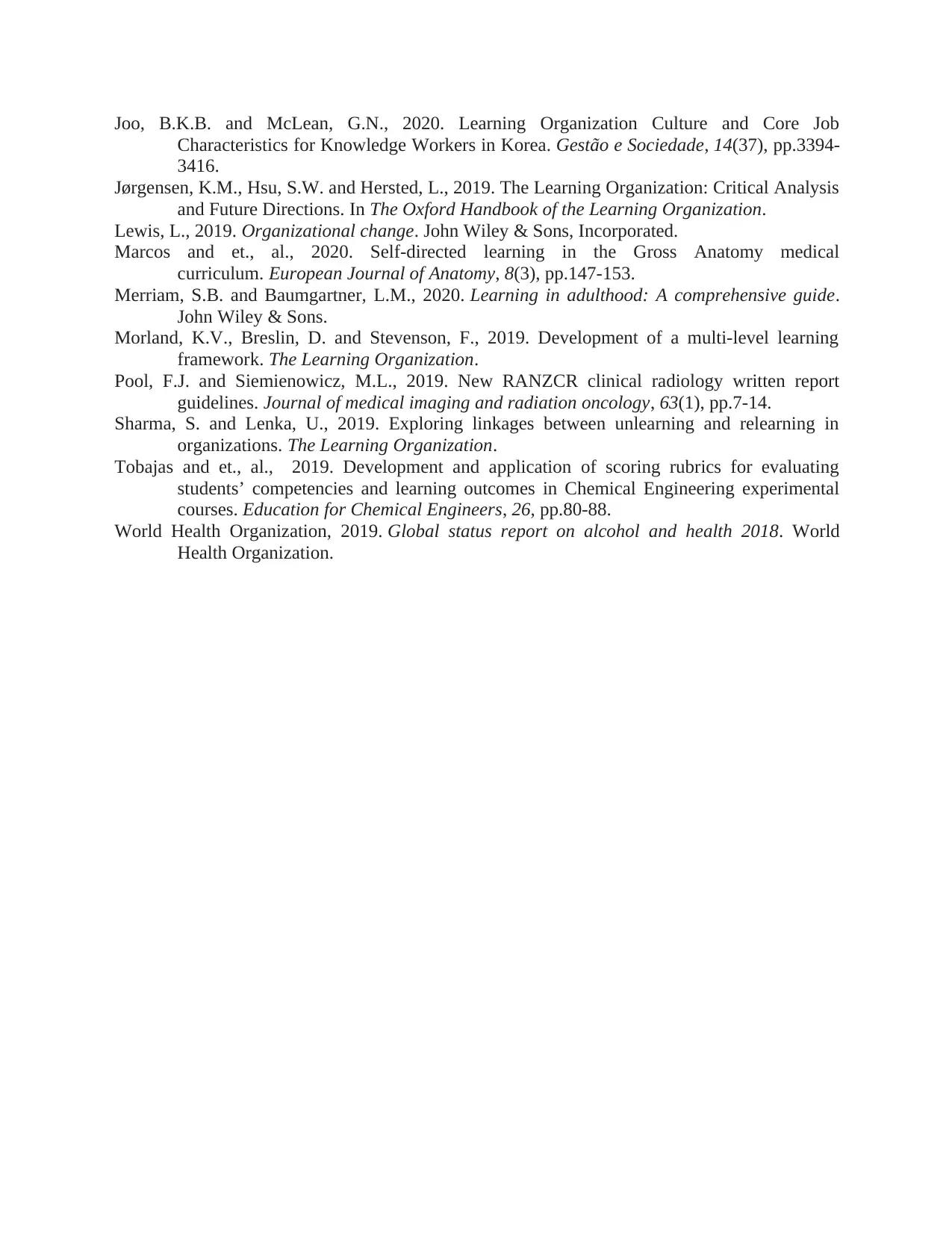
Joo, B.K.B. and McLean, G.N., 2020. Learning Organization Culture and Core Job
Characteristics for Knowledge Workers in Korea. Gestão e Sociedade, 14(37), pp.3394-
3416.
Jørgensen, K.M., Hsu, S.W. and Hersted, L., 2019. The Learning Organization: Critical Analysis
and Future Directions. In The Oxford Handbook of the Learning Organization.
Lewis, L., 2019. Organizational change. John Wiley & Sons, Incorporated.
Marcos and et., al., 2020. Self-directed learning in the Gross Anatomy medical
curriculum. European Journal of Anatomy, 8(3), pp.147-153.
Merriam, S.B. and Baumgartner, L.M., 2020. Learning in adulthood: A comprehensive guide.
John Wiley & Sons.
Morland, K.V., Breslin, D. and Stevenson, F., 2019. Development of a multi-level learning
framework. The Learning Organization.
Pool, F.J. and Siemienowicz, M.L., 2019. New RANZCR clinical radiology written report
guidelines. Journal of medical imaging and radiation oncology, 63(1), pp.7-14.
Sharma, S. and Lenka, U., 2019. Exploring linkages between unlearning and relearning in
organizations. The Learning Organization.
Tobajas and et., al., 2019. Development and application of scoring rubrics for evaluating
students’ competencies and learning outcomes in Chemical Engineering experimental
courses. Education for Chemical Engineers, 26, pp.80-88.
World Health Organization, 2019. Global status report on alcohol and health 2018. World
Health Organization.
Characteristics for Knowledge Workers in Korea. Gestão e Sociedade, 14(37), pp.3394-
3416.
Jørgensen, K.M., Hsu, S.W. and Hersted, L., 2019. The Learning Organization: Critical Analysis
and Future Directions. In The Oxford Handbook of the Learning Organization.
Lewis, L., 2019. Organizational change. John Wiley & Sons, Incorporated.
Marcos and et., al., 2020. Self-directed learning in the Gross Anatomy medical
curriculum. European Journal of Anatomy, 8(3), pp.147-153.
Merriam, S.B. and Baumgartner, L.M., 2020. Learning in adulthood: A comprehensive guide.
John Wiley & Sons.
Morland, K.V., Breslin, D. and Stevenson, F., 2019. Development of a multi-level learning
framework. The Learning Organization.
Pool, F.J. and Siemienowicz, M.L., 2019. New RANZCR clinical radiology written report
guidelines. Journal of medical imaging and radiation oncology, 63(1), pp.7-14.
Sharma, S. and Lenka, U., 2019. Exploring linkages between unlearning and relearning in
organizations. The Learning Organization.
Tobajas and et., al., 2019. Development and application of scoring rubrics for evaluating
students’ competencies and learning outcomes in Chemical Engineering experimental
courses. Education for Chemical Engineers, 26, pp.80-88.
World Health Organization, 2019. Global status report on alcohol and health 2018. World
Health Organization.

⊘ This is a preview!⊘
Do you want full access?
Subscribe today to unlock all pages.

Trusted by 1+ million students worldwide
1 out of 12
Related Documents
Your All-in-One AI-Powered Toolkit for Academic Success.
+13062052269
info@desklib.com
Available 24*7 on WhatsApp / Email
![[object Object]](/_next/static/media/star-bottom.7253800d.svg)
Unlock your academic potential
Copyright © 2020–2026 A2Z Services. All Rights Reserved. Developed and managed by ZUCOL.





